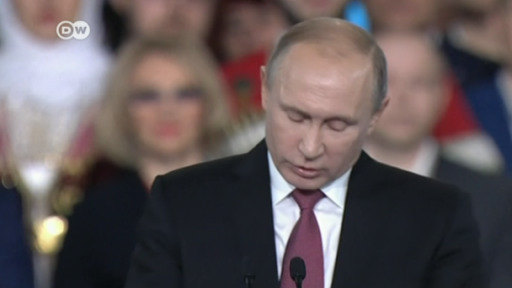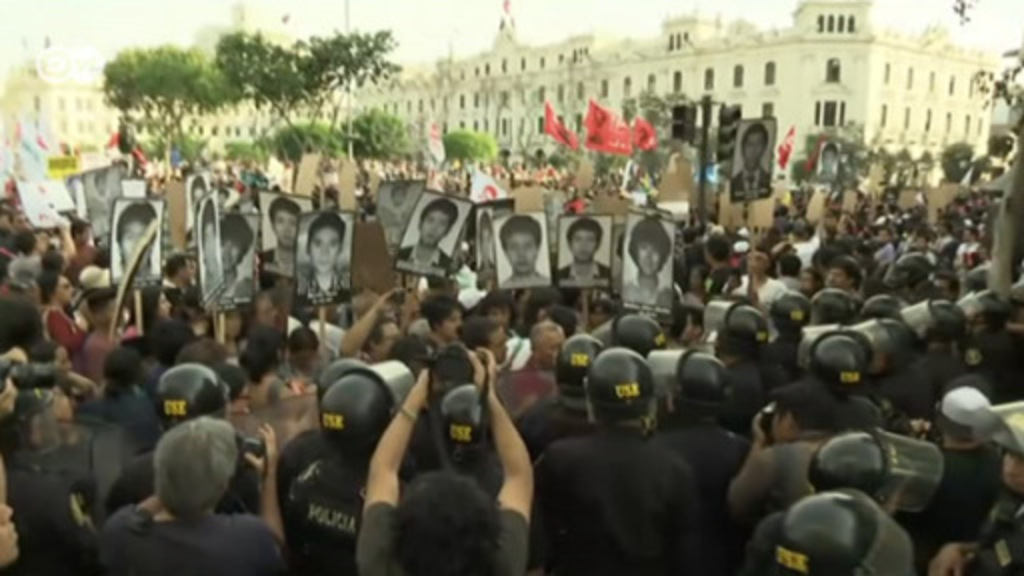Kremlin spokesman Dmitry Peskov on Tuesday said authorities need to determine whether Russian opposition leader Alexei Navalny's call to boycott next year's presidential election are illegal.
"Calls for boycott ought to be carefully studied to see if they are breaking the law," said Peskov, a day after the country's top electoral body voted to formally ban Navalny from running in the 2018 presidential election.
Read more: Alexei Navalny: Russia's barred presidential candidate
On Monday, Navalny called on his supporters to boycott the presidential election, saying Russian Vladimir Putin "is terribly scared and is afraid of running against me." Earlier this month, Putin announced his decision to run for office again.
Although Russian law does not specifically outlaw calls for an election boycott, authorities last year blocked access across the country to websites urging such action.
-
The different faces of Vladimir Putin
From KGB to Kremlin
Putin joined the KGB, the former Soviet Union's security agency, in 1975. In the 1980s he undertook his first foreign posting as a KGB agent to Dresden, Germany. After the fall of the Berlin Wall, Putin returned to Russia and entered Boris Yeltsin's Kremlin. When Yeltsin announced that he wanted Putin as his successor, the way was paved for him to become prime minister.
-
The different faces of Vladimir Putin
First presidency
On his appointment, Putin was virtually unknown to the general public. This changed when in August 1999 armed men from Chechnya invaded the neighboring Russian territory of Dagestan. President Yeltsin appointed ex-KGB officer Putin to bring Chechnya back under the central government's control. On New Year's Eve, Yeltsin unexpectedly resigned and named Putin as acting president.
-
The different faces of Vladimir Putin
Tough guy in the media
During an exhibition hockey game in Sochi, Putin’s team won 18-6, with the president scoring eight goals.
-
The different faces of Vladimir Putin
Limited freedom of speech
A protester wears a tape over his mouth reading "Putin" during an opposition rally. In 2013 the Kremlin announced that the state-owned news agency, RIA Novosti, was to be restructured and placed under the control of a pro-Kremlin figure known for his extreme anti-Western views. Reporters without Borders ranked Russia as 148 in its list of 178 countries in terms of press freedom.
-
The different faces of Vladimir Putin
Putin's Image: A man of action
Putin's image as a man of action, boosted by his having been a KGB spy, has long been part of his appeal in Russia. It is carefully maintained by means of photos where he is seen bare-chested on horseback, or tossing opponents onto a judo mat. In Russia, Putin has earned praise for restoring stability but has also been accused of authoritarianism.
-
The different faces of Vladimir Putin
Stifling democracy
When President Putin's United Russia party won a landslide victory in parliamentary elections in 2007, critics described the vote as neither free nor democratic. Dozens were detained as riot police broke up protests by demonstrators accusing President Putin of stifling democracy. In this rally the poster reads: "Thank you, no!"
-
The different faces of Vladimir Putin
Orchestrated events
In Sevastopol, Crimea, Putin looks through the window of a research bathyscaphe in the waters of the Black Sea. This dive in a mini-submarine was only one of his adventurous stunts; he has also been seen tranquilizing wild tigers and flying with endangered cranes. It was also aimed at cementing his image as an adventurer, and demonstrating his control of the annexed territory of Crimea.
Author: Nadine Berghausen
'Harassment and intimidation'
Human rights groups have warned of growing repression of dissent in Russia ahead of the presidential election slated for March 2018.
Hugh Williamson, who heads the Europe and Central Asia division of Human Rights Watch said authorities need to end their interventions into Navalny and other opposition candidates' campaigns.
Read more: Why Russia thinks spinners are the tools of the opposition
"The pattern of harassment and intimidation against Navalny's campaign is undeniable," Williamson said. "Russian authorities should let Navalyn's campaigners work without undue interference and properly investigate attacks against them by ultra-nationalists and pro-government groups."
Navalny is technically barred from running for president due to criminal convictions, which have been viewed as political retribution for his anti-corruption campaigns. He rose to notoriety in 2009 for investigations into official corruption.
-
Who is Alexei Navalny?
The face of Russia's opposition
The lawyer-turned-political campaigner has been among the most prominent figures of Russia's opposition to President Vladimir Putin. Navalny came to prominence in 2008, when his blog exposing malpractice in Russian politics and among the country's major state-owned companies came to the public's attention. Revelations published on his blog even led to resignations, a rarity in Russian politics.
-
Who is Alexei Navalny?
Disputed parliamentary elections
In 2011, Navalny was arrested for the first time, spending 15 days in prison for his role at a rally outside the State Duma in Moscow. The parliamentary election victory for Putin's United Russia was marred by instances of ballot stuffing, reported by demonstrators on social media. Upon his release, Navalny pledged to make "extraordinary efforts" to continue the protest movement.
-
Who is Alexei Navalny?
Second jail term
After being re-elected president in 2012, Putin ordered Russia's Investigative Committee to launch a criminal enquiry into Nivalny's past. The following year the campaigner was charged and sentenced again, this time for five years, for alleged embezzlement in the city of Kirov. However, he was released the following day pending affirmation from a higher court. The sentence was later suspended.
-
Who is Alexei Navalny?
Anti-Kremlin platform grows
Despite being embroiled in legal troubles, Navalny was allowed to run in the 2013 Moscow mayoral election. A second-place finish behind Putin-ally Sergei Sobyanin was seen as an overwhelming success and galvanized the Russian opposition movement.
-
Who is Alexei Navalny?
Navalny takes to social media
His anti-Kremlin rhetoric has led to Navalny being banned from appearing on Russian state-owned television. That has forced him to deliver his political message over social media and his blog. His talent for public speaking, punchy use of language and humorous mockery of Putin and his loyalists has mobilized a legion of young followers.
-
Who is Alexei Navalny?
Presidential ambitions
In December 2016, the opposition leader announced the formal start of his campaign to run for the Russian presidency in March 2018. However, repeated accusations of corruption, which his supporters say are politically motivated, could ultimately bar him from running for public office.
-
Who is Alexei Navalny?
Convicted of corruption
In 2016, the European Court of Human Rights ruled that Russia had violated Navalny's right to a fair trial in the Kirov case. Although Russia's Supreme Court overturned the five-year sentence, the verdict was sent back to the Kirov court, which in 2017 again charged Navalny with a suspended five-year sentence. Navalny's challenge against the ruling remains ongoing.
-
Who is Alexei Navalny?
Moscow's biggest protests in six years
In February, 2017, anti-corruption rallies across dozens of Russian cities led to the arrests of over 1,000 demonstrators, including Navalny. The protests, believed to have been the largest in the Russian capital since 2012, were spurred by a report published by Navalny linking Prime Minister Dmitry Medvedev to a billion-euro property empire. The presidential candidate was released 15 days later.
-
Who is Alexei Navalny?
Physically assaulted
Navalny was assaulted and hospitalized in April 2017 after being hit in the eye with a chemical green dye, permanently damaging his right cornea. Navalny accused the Russian authorities of stopping him from seeking medical treatment abroad due to the embezzlement conviction against him. However, he was eventually permitted by the Kremlin human rights council to travel to Spain for eye surgery.
Author: David Martin
ls/rc (Reuters, AP)
























